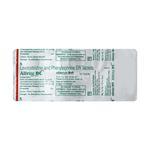PHENYLPROPANOLAMINE + LEVOCETIRIZINE
Phenylpropanolamine: Phenylpropanolamine (PPA) is a sympathomimetic amine that constricts blood vessels and stimulates the central nervous system. It was primarily used as a decongestant and appetite suppressant. However, it has since been withdrawn from the market in some countries due to safety concerns.
PPA works by activating alpha-adrenergic receptors in the body, causing blood vessels to constrict and reducing swelling in the nasal passages. It also stimulates the release of norepinephrine, a neurotransmitter that enhances alertness and decreases appetite.
The recommended dose of PPA for decongestant use was typically 25-75 mg taken orally every 4-6 hours. As an appetite suppressant, the recommended dose was 75 mg taken orally once or twice daily before meals.
However, it is important to note that PPA has been linked to an increased risk of hemorrhagic stroke, especially in women. Several studies have found a correlation between PPA use and strokes, leading to its removal from the market in some countries. Other potential side effects of PPA include increased blood pressure, heart palpitations, anxiety, insomnia, dizziness, and tremors.
Given these safety concerns, it is essential to consult with a healthcare professional before using PPA or any other medication for decongestion or appetite suppression.
Levocetirizine: Levocetirizine is an antihistamine drug used to relieve allergy symptoms such as sneezing, runny nose, itchy or watery eyes, and itching of the nose or throat. It is commonly prescribed for conditions like hay fever, allergic rhinitis, and chronic idiopathic urticaria.
The mechanism of action of Levocetirizine involves blocking the histamine H1 receptors in the body. Histamine is a naturally occurring substance in the body that causes allergic symptoms when released. By blocking the activity of histamine, Levocetirizine helps alleviate allergic symptoms.
The usual recommended dose of Levocetirizine for adults and children over 12 years old is 5 mg once daily. For children aged 6-11 years, the recommended dose is 2.5 mg once daily. It can be taken with or without food. The dose may be adjusted in patients suffering from certain medical conditions or in elderly individuals.
Like any medication, Levocetirizine can cause certain side effects. Common side effects include drowsiness, fatigue, headache, dry mouth, sore throat, and nasal congestion. These side effects are usually mild and transient. In rare cases, more serious side effects such as allergic reactions, rapid or irregular heartbeat, difficulty urinating, and mental/mood changes may occur. If any of these severe side effects occur, it is important to seek immediate medical attention.
It is also worth noting that Levocetirizine may interact with other medications. It is important to inform your healthcare provider about all the medications you are currently taking to avoid any potential drug interactions.
In summary, Levocetirizine is an antihistamine used to relieve allergy symptoms. It works by blocking the histamine H1 receptors in the body. The recommended dose is typically 5 mg once daily for adults. Common side effects include drowsiness, dry mouth, and headache. It is important to talk to your healthcare provider about any concerns or questions you may have before starting this medication.

